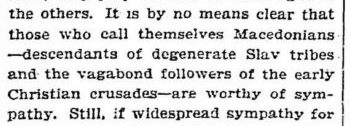Објаснувајќи ја дипломатската состојба за време на Илинденското Востание весникот на едно место пишува: „Во целост е јасно дека оние кои себе си се нарекуваат Македонци – потомци на дегенерирани словенски племиња и скитници придружници на христијанските крстоносци – се вредни за наклонетост. “

„… IN MACEDONIA.
New life appears suddenly to have been
imparted to the insurrection in that
group of Turkish vilayets which we call
Macedonia. Another Russian Consul has
been murdered—the second. The revival
of the revolt against Turkish rule is said
to be due to the premature outbreak of
a well-organized, long-prepared, and pos-
sibly formidable rebellion. There is little
doubt that the situation is more ” se-
rious ” than it was last Spring, at least,
in a diplomatic sense. The foreign Con-
suls in the Balkans, who remain the
chief, possibly’ the only, authentic sources
of information, intimate as much. The
functions of these Consuls, taken in con-
nection with the diplomacy of Prince
Ferdinand of Bulgaria, throw consid-
erable light upon the whole intricate,
mysterious, yet ever fascinating situa-
tion.
To begin with the Consuls: The recent
publication by the Foreign Departments
of Austria, France, and England of the
correspondence that has passed between
these Governments and their respective
embassies in Constantinople, show’s that
the Consular Corps in the vilayets has,
for some months past, been organized on
the principle of an eleborate new’s-gath-
ering agency, which enables the For-
eign Ministers In Vienna. Paris, and Lon-
don to learn at first hand and at the ear- |
ɪiest moment exactly what is going on, |
If it w’ere customary for the Govern-
ments in Berlin and. St. Petersburg to
make similar publications the same re-
sult would be shown, ɑ A free hand ”
having been given the Turk to tranquil-
lize Macedonia in his own way, he must
needs be watched. Not so much that the
unnoted rigor oL his traditional method
may inflame public sentitnent In West-
ern Europe and thus embarrass the
Chancelleries thereof, as that these Chan-
celleries are in mortal fear that the wily
Turk, either at Constantinople or in the’
field, may play off one of them against
the others. It is by no means clear that
those who call themselves Macedonians
—descendants of degenerate Slav tribes-
and- the vagabond followers of the early
Christian crusades—are worthy of sym-
pathy. Still, if widespread sympathy for
them should, be aroused in Western Eu-
rope as the result of some particularly
atrocious acts on the part of the Turkish r
reformer,” it could be more easily con- I
trolled by the Governments than could
the public opinion that their prestige
had suffered and. that national interests
had been placed in jeopardy. Thus, while
watching the Turk they watch’ each oth-
er. In each case their clearness of vision
is somewhat, obscured = or mystified by
the remarkable attitude of Prince Feirdi-
nand—his intimacy with the propaganda
of the Macedonian Revolutionary Com-
mittee and his relations with St. Pe-
tersburg.
On his return to Sofia from a.visit to
Paris last Spring, where a call at the
Russian Embassy, in the Rue Grenelle
St. Germain, was noted, he “ discharged ”
his Cabinet’, appointed a new one, and
announced his intention to aid the Turk
in the work of ** reform.” He opened di-
rect communication with Constantinople
and sent an envoy thither. It is curious
that his subjects, ardent supporters of
the Macedonian cause, made no com-
plaint; nor did hɪs army, many of whose
officers had gone into the vilayets in
charge of filibustering expeditions. Two
months later he announced that all his
righteous endeavors had availed naught.
He issued a circular note to the Powers
to that effect. In it he called attention
to the outrageous manner in which the
Turk was treating Bulgarian sojourners
in Macedonia; he pointed to the mobiliza-
tion of Turkish troops on his frontier,
and he added: “ The princely Govern-
ment henceforth declines all responsibil-
ity for the further development of events
in ease the imperial Government (Tur-
key) persists in its unfriendly disposi-
tion with regard to Bulgaria.”
But Turkey has persisted in this dis-
position, and the Powers have persisted
in ignoring the responsibility which
Prince Ferdinand would fasten on them.
He knows now, if he did not know be-
fore, just as his master in St. Petersburg
knows, that so long as the Turk confines
his operations to his own vilayets, what-
ever may be his depredations there,
Western Europe will not intervene. The
Turk knows this, too. He realizes that
the crossing of the Bulgarian frontier,
whatever the provocation, would mean
the end of his empire. The Russian In-
stitution, which has so carefully planned
the situation, would not suffer Bulgaria
to be defeated. With the intervention
of the Institution the interests of Prance,
Great Britain, Germany, and Austria-
Hungary would demand action by these
Governments.
All this is inevitable. Its remoteness
depends upon the patience of the Turk to
endure without retaliation the obvious
interference of Bulgaria in his affairs;
upon the resources of the revolutionists;
but, more than all, upon the desire of
the Russian Institution to have the cli-
max deferred until the constantly aug-
menting physical strength of the empire
shall be sufficient to defy Western Eu-
rope.
Published: August 10, 1903
Copyright © The New York Times …“
Посочил: Ѕале

